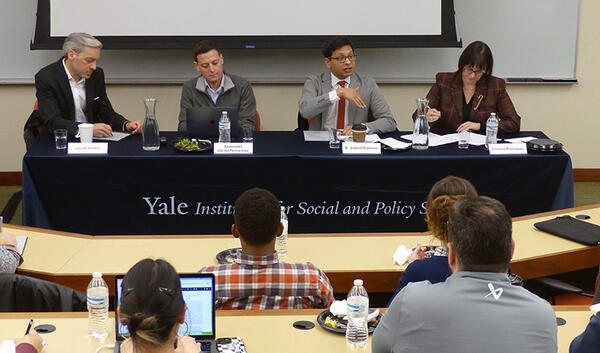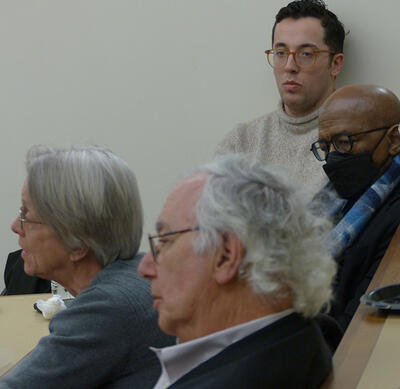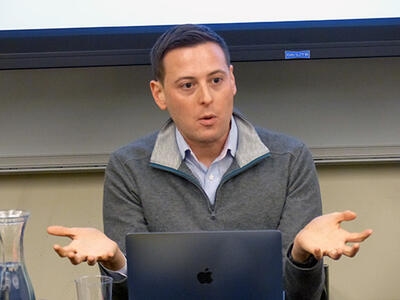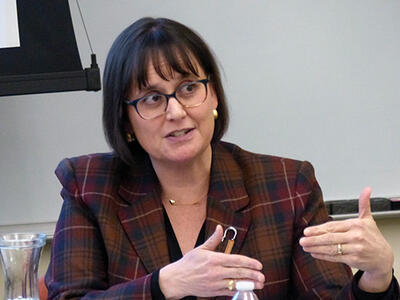Making Bureaucracy Work for Democracy: Equity, Sustainability, and Dignity in the Administrative State

In a 1986 press conference, President Ronald Reagan famously said, “The nine most terrifying words in the English language are: I’m from the government, and I’m here to help.”
In oral arguments before the U.S. Supreme Court last month echoing the motivations behind that statement, a majority of justices appeared likely to overturn a 40-year-old ruling that calls for courts to defer to federal agencies’ reasonable interpretations of ambiguous laws when implementing regulations.
Conservatives have sought such a ruling for years, aiming to reduce the size and influence of what has become known as the administrative state.
Should “bureaucracy” be a dirty word, particularly considering bipartisan federal government action to address the COVID-19 pandemic? Or regarding the need for collective action to mitigate the effects of climate change? And more generally, can and should the administrative state work toward better equity, sustainability, and dignity?
Last week, the American Political Economy eXchange (APEX) at Yale’s Institution for Social and Policy Studies (ISPS) convened leading scholars on the topic — including two former Biden Administration officials — to explore recent trends in federal bureaucratic practices and what can be done to make the system work better for democracy. APEX is dedicated to the study of American democratic capitalism, the analysis of the interplay of markets and government in the United States.
“I think of this topic today as the most important conversation we’re not having,” said Jacob Hacker, director of APEX, a faculty fellow with ISPS, and Stanley B. Resor Professor of Political Science. “The conversation is really about what kind of administrative state we have today and what kind of administrative state we want to have.”
Alan Gerber, ISPS director and Sterling Professor of Political Science, thanked Hacker for organizing the event and moderating such a “timely and important high-level discussion among three exceptionally influential thinkers and political actors.”
“APEX, with its capacity for facilitating vital conversations like this, furthers the mission of ISPS to engage in research and intellectual exchanges that help us learn how to create and support honest, responsive, efficient, and inclusive government,” Gerber said.
K. Sabeel Rahman, a professor at Cornell Law School, led the Office of Information and Regulatory Affairs (OIRA) in the Office of Management and Budget (OMB) from 2021 to 2023 with a focus on implementing a range of President Biden’s executive orders, including efforts to modernize regulatory review, advance equity in the regulatory process, address market concentration, and enhance public participation.
Rahman said these efforts created “a language, a culture, and coordination mechanism” to help agencies incorporate concepts such as equity, participation, competition, and administrative burden into their policymaking. Through these efforts, agencies are rethinking how they engage impacted communities, and how they can better streamline how Americans access vital services or benefits like disaster relief or safety net programs, he said.
“The equity executive order changed a whole host of internal protocols, cultures, languages, and practices that opened up a different kind of internal policy space within the executive branch,” Rahman said.
In addition, Rahman referenced another executive order that created a council comprised of cabinet officials charged with reporting in person to the president about what they were doing to promote competition in American industries that have been rapidly consolidating in recent decades.
“These executive orders created a different way of thinking about policy problems,” he said. “Which then filtered down into day-to-day operations of the agency.”
Alexander Hertel-Fernandez, an associate professor of international and public affairs at Columbia University, served in the White House Office of Information and Regulatory Affairs and in the U.S. Department of Labor, where he led the department’s efforts in research and evaluation, launching programs to delve into and rectify imbalances in access to unemployment insurance while refining methods to gauge job quality.
Hertel-Fernandez said that efforts to modernize regulatory review emphasizes the need to reach beyond the usual industry groups and engage with underserved communities, ideally starting at the earliest stages of policy design.
“We know that if we just keep federal agencies’ typical open-door and hands-off policy, it’s going to be the most advantaged interests who end up taking advantage of that,” he said. “Both because they are aware of the process and also because they’re the ones who have the resources to prepare the necessary materials and interventions that can actually shape agency outcomes.”
Among other efforts, he said agencies must consider location and timing of public sessions to lift barriers to participation while also demonstrating accountability to the communities that government is trying to reach.
“It’s not just enough to do this work of engaging more participants in the regulatory process, but agencies need to close the loop and show the difference communities’ participation made in policymaking,” Hertel-Fernandez said. “That means saying to members of the public, ‘You provided these comments, or you showed up to our town hall and gave us these ideas, and here’s how it made a difference in this or that program.’”
Cristina Rodriguez, Leighton Homer Surbeck Professor of Law at Yale Law School, served as co-chair of President Biden’s Commission on the Supreme Court. She noted that while arguments around the administrative state often make distinctions between law and policy, she and a co-author, Anya Bernstein of the University of Connecticut, argue that the statutes the Supreme Court interprets could not be brought to life without the administrative agencies.
“I think one way of describing what we produce — if you put it in a conversation with what Sabeel and Alex are doing — is a love letter to the administrative state that requires a corrective,” Rodriguez said. “In the end what we hope to show are the possibilities inside the administrative agencies for the promotion of democratic government — but not by any means perfection.”
In a draft law review article based on semi-structured, open-ended interviews with federal civil servants and political appointees serving over recent decades, Rodriguez and Bernstein spotlight how agencies describe a “duty of loyalty” to the statutory regime under which they operate, pursuing their mission and adapting as the rules change over time based on litigation and new presidential leadership.
In addition, Rodriguez said that agencies demonstrate a “duty of care,” making statutes workable for the public either proactively or reactively. She stressed how officials she interviewed regularly discussed how they respond to inquiries from affected individuals and institutions, such as school districts that might not understand the latest Department of Education guidance.
“The duty of care as we describe it shows how agencies are pluralistic in their sourcing and ongoing in their policymaking,” she said. “That makes them institutionally, in some ways, preferable to Congress as policymakers. “
The Supreme Court might change that equation in a ruling expected in June. Certainly, November’s election will have major consequences for how federal agencies operate.
Hertel-Fernandez called for bolstering resources invested in the federal civil service and new protections for workers and their capacity to deliver services that citizens need and want.
“The attacks on the administrative state, including attempts to starve funding, is a proxy fight over what kind of democracy we want to have,” he said. “It protects workers, it protects us against environmental pollution. It advances civil rights. It’s precisely for those reasons that you see a multi-pronged attack on these institutions. It is a fight over the central democratic instrumentality that is the administrative apparatus.”